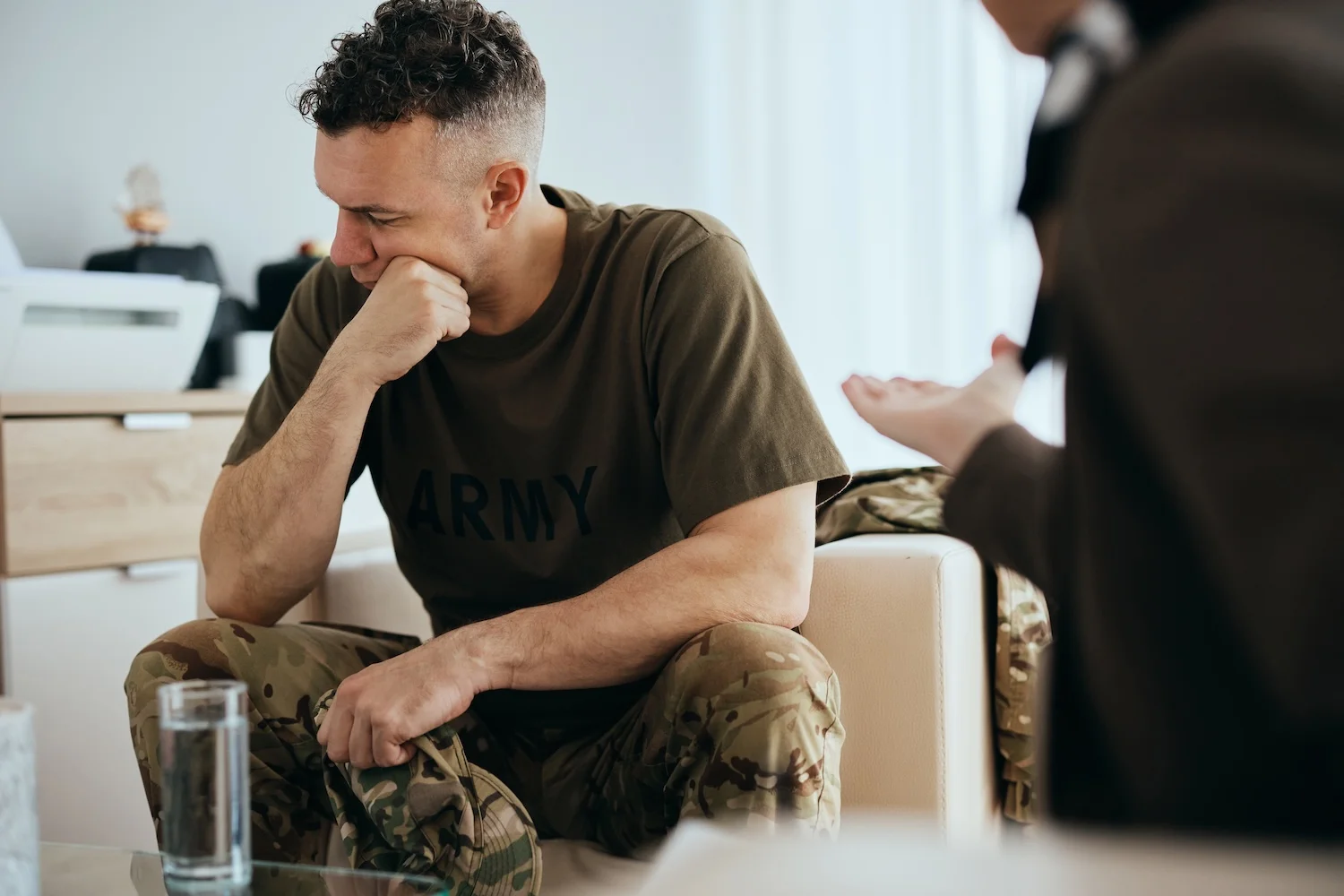Many veterans live with co-occurring disorders like post-traumatic stress disorder (PTSD) combined with substance use challenges. According to one study, nearly two-thirds of OEF/OIF veterans with a substance use disorder also have a mental health condition. These issues are common responses to difficult situations and not a reflection of weakness. Specialized programs can help veterans learn to manage their mental health and overcome substance use issues at the same time.
What kind of dual diagnosis issues do veterans deal with?
Dual diagnosis means that someone has co-occurring conditions. It's commonly used to describe when someone has a substance use disorder and a mental health condition. Among veterans, these are some of the most common:
Substance use disorders
- Alcohol use disorder: This is widely recognized as the most common substance use challenge among veterans, often rooted in military culture as a coping mechanism for stress or a form of socialization.
- Prescription opioid misuse: A growing concern, particularly as veterans with co-occurring mental health conditions like PTSD are more likely to receive and use opioid prescriptions, sometimes at higher doses.
- Cannabis use disorder: While marijuana is sometimes prescribed to help manage chronic pain and PTSD, it can be misused—and cause physical dependence.
Mental health conditions
- Post-traumatic stress disorder (PTSD): PTSD is perhaps the most frequent co-occurring mental health condition. Symptoms such as intrusive thoughts and hyperarousal often drive veterans to substances in an attempt to find relief.
- Depression: Veterans struggling with depression are significantly more susceptible to substance use disorders, with depressive symptoms often preceding or exacerbating the risk of relapse.
- Anxiety and adjustment disorders: These conditions are common, especially for veterans transitioning back to civilian life. They can heighten psychological distress and intensify cravings, making integrated care crucial.
Other issues
Many veterans also live with other stressors, including chronic pain from physical injuries and chronic overexertion, sleep disturbances, interpersonal conflicts, and challenges in life satisfaction.
The good news is that help is available. Evidence-based approaches, like cognitive-behavioral therapy (CBT) and motivational interviewing, can lay the foundation for long-term recovery. Medications can also help manage mental health symptoms and cravings during detox, which can make it easier to engage with therapy.
Types of dual diagnosis care available to veterans
There are several different approaches and levels of care in dual diagnosis treatment. The most important thing is to find a program that makes the unique needs of veterans a priority. Depending on your unique needs, you may need one or more types of treatment for it to be most effective:
Detox: A medically monitored program that makes withdrawing from drugs or alcohol safer and more comfortable. It reduces the risk of relapse and helps people become stable for the road ahead.
Residential/inpatient treatment: 24/7 care in a facility, which could be a hospital setting or private rehab center. This is where people do deep recovery work with a team of licensed professionals.
Outpatient treatment: Partial hospitalization (PHP), intensive outpatient (IOP), and outpatient (OP) programs offer flexibility and support while people go about their daily lives. These are best for vets who are stable, but still need support.
Dual diagnosis treatment—at any level of care—helps people manage their mental health and overcome addiction. Integrated care is more effective than just trying to address one issue or the other.
What methods are used in treatment programs?
It depends. Most accredited programs will use a combination of medication-assisted treatment (MAT), individual therapy, family therapy, and group counseling. Some may include holistic services, like meditation, massage, or exercise classes. Different programs also use different approaches. The 12-step approach is popular (you may have heard about it in Alcoholics or Narcotics Anonymous meetings), but isn't right for everyone. If you've tried it before or don't connect with its message, consider a non-12-step program.
VA vs. non-VA treatment
Many vets are used to having all of their appointments at the VA. The VA does offer mental health and substance use treatment, including in Pensacola. Some, though, prefer non-VA providers. When you're looking for treatment, consider whether you prefer a VA or non-VA provider—and the amount of time you'll have to wait for treatment.
Paying for treatment
Private treatment centers often accept major health insurance plans, including TRICARE, and sometimes offer plush accommodations in their veterans programs. Some also offer cash pay rates or sliding scale fees, depending on your financial situation. You can always verify your insurance for free with Gulf Breeze Recovery to find out what your benefits cover.
Is private rehab worth it?
Private rehab centers go above and beyond to offer comfortable amenities, excellent service, and a wide range of treatment options. If you're considering outpatient treatment, think about a private program like Gulf Breeze Recovery. Our outpatient program for vets includes:
- Individual counseling with licensed therapists who know about military life
- Group sessions with other vets who have shared experiences
- Family and couples education for relationship repair and encouragement
- Safe space to build coping skills for long-term wellness
- Sessions at our serene center on the Santa Rosa Sound
- Telerecovery options for those who need extra flexibility
- Exercise programming at the Gulf Breeze YMCA
- Medication management and MAT with regular psychiatric check-ins
- Non-12-step programming for a personalized approach to recovery
We also provide medical detox and residential treatment services at our center on Pensacola Beach Road. No traveling out of state, no requirement to follow the 12 steps—just compassionate, professional care from a team that knows that veterans need specialized treatment.
Trusted dual diagnosis care for vets in Gulf Breeze
The veterans program at Gulf Breeze Recovery provides dual diagnosis treatment. Whether you need detox, residential, or outpatient support, we have an option for you at our rehab center on the Emerald Coast. We accept TRICARE and most major insurance plans. Not sure if you need treatment? Give us a call at 833.551.2304 or contact us online and speak with someone on our admissions team. We're here to listen, not judge.

